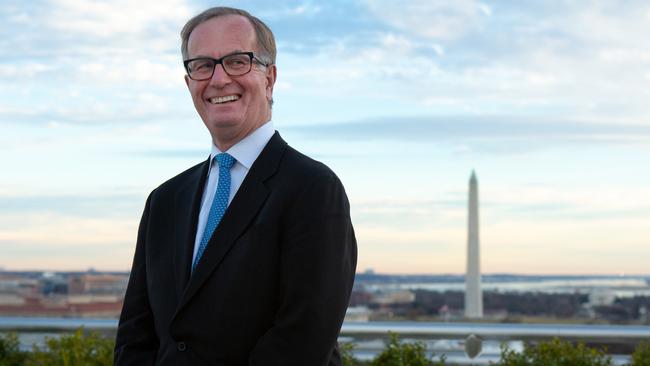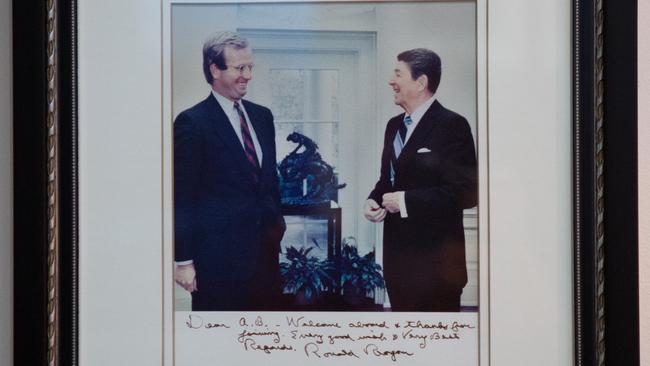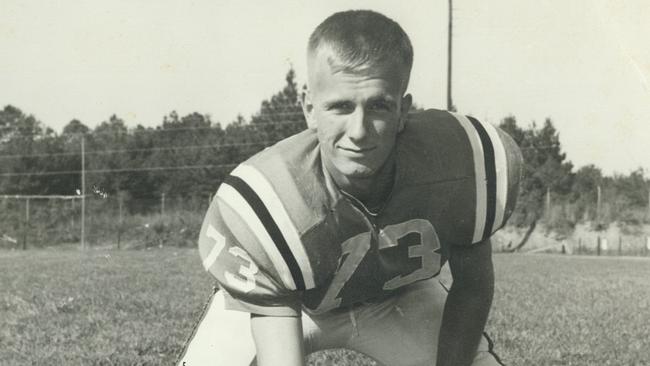US envoy to Australia in the thick of it, just as he likes it
Arthur Culvahouse remembers the moment when he realised how much he wanted to become the next US ambassador to Australia.

Arthur Culvahouse remembers the moment when he realised how much he wanted to become the next US ambassador to Australia.
He was laying a small wreath at Canberra’s War Memorial when he became transfixed by the stunning view across Lake Burley Griffin to Parliament House.
“It was then and there … that I decided that this assignment was worth pursuing,” he said.
It was last September and Mr Culvahouse was on a secret visit to Australia to scope it out and see if he wanted to accept US Secretary of State Mike Pompeo’s offer of the ambassadorship.
Mr Pompeo knew about the visit but Mr Culvahouse didn’t tell those Australians he met in Canberra, including retired generals and think tanks, about the true purpose of his visit. “I visited Canberra and did not visit anyone in government, yours or ours, but I went with a high-level blessing of the State Department,” he said in an interview in Washington.
Now Mr Culvahouse is preparing to arrive in Canberra next month to take up his duties in what he hopes will be the “capstone” of a remarkable political legal career that has stretched from Watergate in the early 1970s through to Ronald Reagan and now Donald Trump.
Mr Culvahouse, 70 and a father of three grown daughters, is not your typical ambassador. Born into a rural farming family in Tennessee, he rose to become the keeper of Washington’s secrets, a backroom player and lawyer present at some of the most remarkable moments in political history.

In the 1970s, Mr Culvahouse found himself in the Oval Office when Richard Nixon discussed the infamous Watergate tapes. In the 1980s, as White House counsel, he helped steer Reagan through the Iran-Contra affair. In 2008, he vetted Sarah Palin as John McCain’s vice-presidential running mate. And in 2016 he vetted Mike Pence as Mr Trump’s running mate. Just a few months ago, Mr Trump spoke to Mr Culvahouse about becoming the President’s lawyer.
For Australia, the benefit of Mr Culvahouse’s appointment is that he has the ability to pick up the phone directly to the President, something not all US ambassadors to Australia have been able to do.
He arrives in this country at a time of a historic transition in the Indo-Pacific, with a rising China posing security and economic challenges to Australia, the US and the region. Mr Culvahouse is no Asia novice. After a career in the influential Washington law firm O’Melveny & Myers, he has a solid understanding of Asia and especially of China, having represented many US firms doing business with Beijing. He described China as a “success story” and said he respected much about the country. But he does not respect what he sees as China’s “inappropriately aggressive” behaviour right now across the Indo-Pacific.
“What concerns me is that, right now, China is being inappropriately aggressive, particularly on freedom of the seas, freedom of the skies (and) coercive on economic policy,” he said.
“They are just not playing by the rules, whether it is the WTO, and certainly not the freedom of the seas. Their conduct in the South China Sea, I think, is particularly concerning. It makes (the Australia-US alliance) more relevant, yes, absolutely.”

His comments came only a day after China blocked some Australian coal exports in what appears to be a political protest against Canberra’s policies towards Beijing.
Mr Culvahouse said his message to Australians was that the alliance was “solemn and unbreakable”.
When he arrives in Canberra he plans to “pressure test” the US-Australia relationship, to see if he can detect any weaknesses. “The alliance is probably as strong as it has ever been from a military and intelligence point of view,” he said. “One of the things I have set out to do after arriving is to pressure test the relationship just to make sure I can identify any cracks or flaws and address those. And I frankly have found none so far.”
Mr Culvahouse said he first met Mr Trump in May 2016 when the then Republican nominee asked him to vet potential candidates to run as his vice-president. “I thought he would be interviewing me for the assignment but he basically said, ‘How soon can we get started’,” Mr Culvahouse said. “I like to say that I don’t recommend, but I vet. I identify the pros and the cons, the background issues and the strengths. But true to form, as Jared Kushner predicted, Trump said, ‘Who should I pick?’ ”
Mr Culvahouse said he replied: “Mike Pence.”
When he begins his ambassadorial duties, Mr Culvahouse will be filling a post that has been vacant for almost 2½ years since ambassador John Berry left Australia in September 2016.
Cameron Stewart is also US contributor for Sky News Australia



